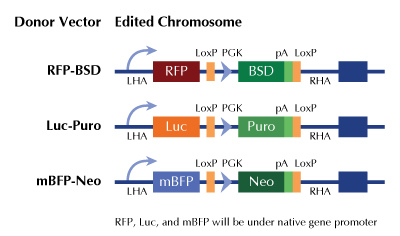Aconitase 1 (ACO1) Human Gene Knockout Kit (CRISPR)
CAT#: KN201857BN
ACO1 - human gene knockout kit via CRISPR, HDR mediated
Functional Cassette: GFP-puro Luciferase-Puro RFP-BSD
HDR-mediated knockout kit validation
USD 1,657.00
4 Weeks*
Specifications
| Product Data | |
| Format | 2 gRNA vectors, 1 mBFP-Neo donor, 1 scramble control |
| Donor DNA | mBFP-Neo |
| Symbol | Aconitase 1 |
| Locus ID | 48 |
| Components |
KN201857G1, Aconitase 1 gRNA vector 1 in pCas-Guide CRISPR vector KN201857G2, Aconitase 1 gRNA vector 2 in pCas-Guide CRISPR vector KN201857BND, donor DNA containing left and right homologous arms and mBFP-Neo functional cassette. GE100003, scramble sequence in pCas-Guide vector |
| Disclaimer | These products are manufactured and supplied by OriGene under license from ERS. The kit is designed based on the best knowledge of CRISPR technology. The system has been functionally validated for knocking-in the cassette downstream the native promoter. The efficiency of the knock-out varies due to the nature of the biology and the complexity of the experimental process. |
| Reference Data | |
| RefSeq | NM_001278352, NM_002197, NM_001362840 |
| UniProt ID | P21399 |
| Synonyms | ACONS; HEL60; IREB1; IREBP; IREBP1; IRP1 |
| Summary | The protein encoded by this gene is a bifunctional, cytosolic protein that functions as an essential enzyme in the TCA cycle and interacts with mRNA to control the levels of iron inside cells. When cellular iron levels are high, this protein binds to a 4Fe-4S cluster and functions as an aconitase. Aconitases are iron-sulfur proteins that function to catalyze the conversion of citrate to isocitrate. When cellular iron levels are low, the protein binds to iron-responsive elements (IREs), which are stem-loop structures found in the 5' UTR of ferritin mRNA, and in the 3' UTR of transferrin receptor mRNA. When the protein binds to IRE, it results in repression of translation of ferritin mRNA, and inhibition of degradation of the otherwise rapidly degraded transferrin receptor mRNA. The encoded protein has been identified as a moonlighting protein based on its ability to perform mechanistically distinct functions. Alternative splicing results in multiple transcript variants [provided by RefSeq, Jan 2014] |
Documents
| Product Manuals |
| FAQs |
| SDS |
Resources
Other Versions
| SKU | Description | Size | Price |
|---|---|---|---|
| KN201857 | ACO1 - human gene knockout kit via CRISPR, HDR mediated |
USD 1,657.00 |
|
| KN201857LP | ACO1 - human gene knockout kit via CRISPR, HDR mediated |
USD 1,657.00 |
|
| KN201857RB | ACO1 - human gene knockout kit via CRISPR, HDR mediated |
USD 1,657.00 |
|
| KN401857 | ACO1 - KN2.0, Human gene knockout kit via CRISPR, non-homology mediated. |
USD 1,657.00 |
|
| GA100036 | ACO1 CRISPRa kit - CRISPR gene activation of human aconitase 1 |
USD 1,657.00 |
{0} Product Review(s)
Be the first one to submit a review






























































































































































































































































 Germany
Germany
 Japan
Japan
 United Kingdom
United Kingdom
 China
China
